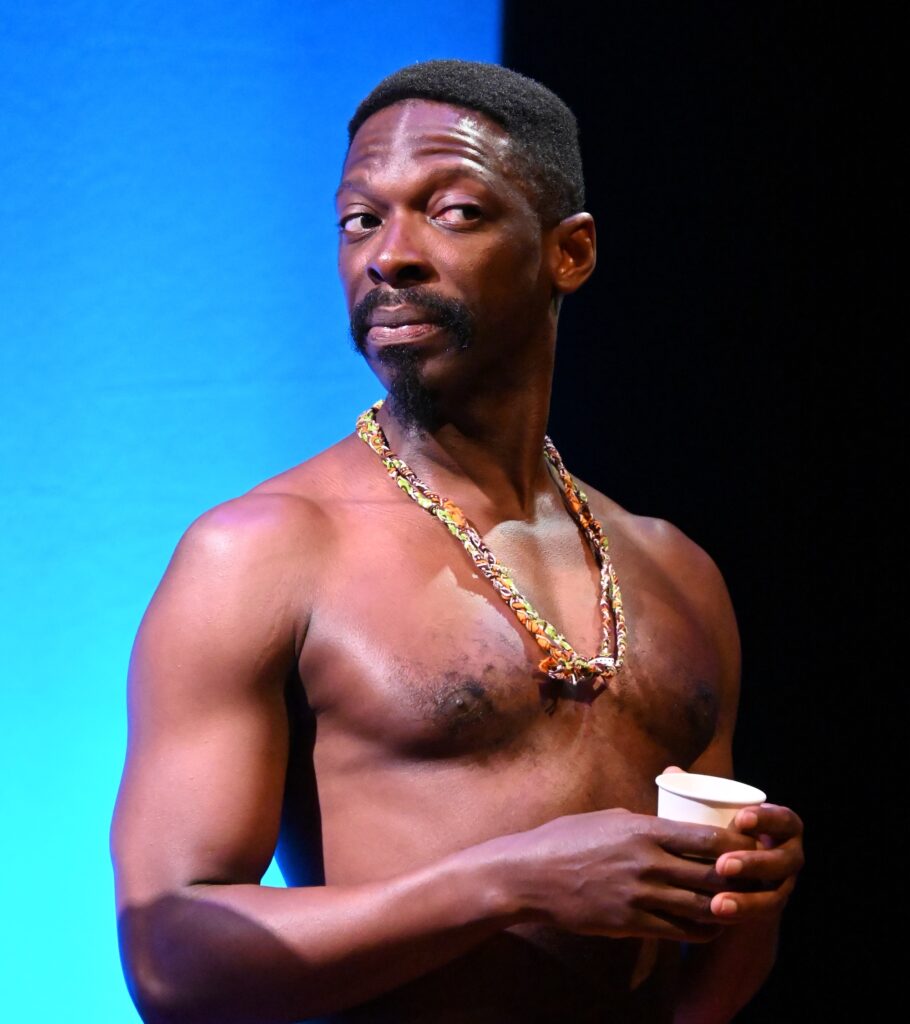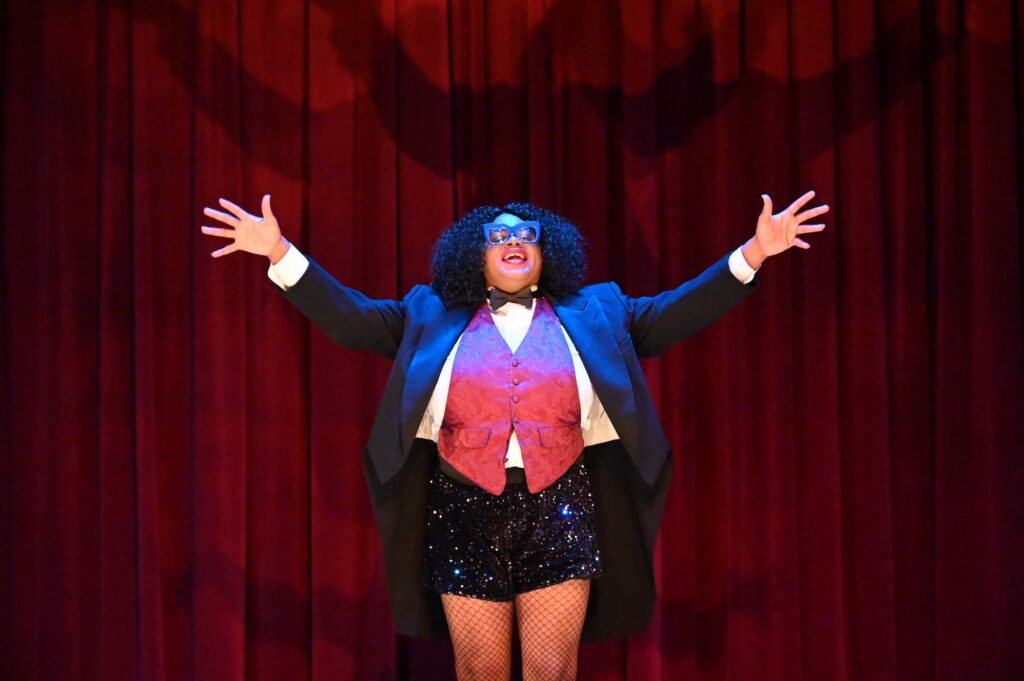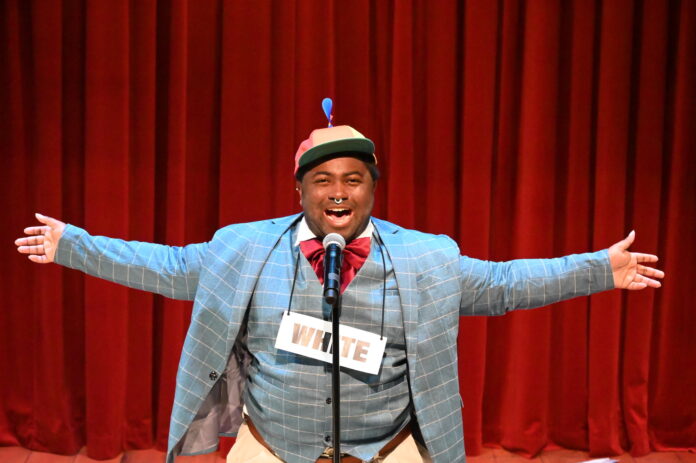Being a Black critic comes with a perpetual downside. Not only do Black folks think you’re a sell-out if you don’t praise an all-Black work, but white people are constantly second-guessing your critiques because of their preconceived notions of Blackness—in fact, they’ll constantly tell you that their familiarity with “the works of the oppressed” makes them experts in all marginalized identities. As both artist and critic, I can speak to the necessity of the latter in relation to the former, no matter how much other artists disagree. (I recently watched The Menu, a pretty good film that perpetuates the stereotype of critics as merely envious trolls.) Black art critique means bracing yourself for the incoming stones when saying Amiri Baraka’s Dutchman is overrated and mediocre.
I thought of Baraka’s piece as I watched Mark Anthony Thompson’s The Ni¿¿er Lovers, the world premiere of which ran through May 27 at The Magic Theatre at Fort Mason, SF. I also thought of George C. Wolfe’s The Colored Museum, of Ntozake Shange’s for colored girls who have considered suicide / when the rainbow is enuf, of white playwright Jean Genet’s Les Noirs (The Blacks), and of Lorraine Hansberry’s “Fuck you, Genet!” script Les Blancs (The Whites). I thought about what could be considered the right and wrong ways to tackle this sort of examination of Blackness without slipping into pretentious self-importance.
The Ni¿¿er Lovers opened promisingly: after admiring the sconces in Brittany White’s cabaret set, I settled in as the show began in darkness, with only the sound of lapping waves filling the theater. The waves were soon joined by the sounds of crying, whip cracks, and other audio cues signifying a slave ship. When the lights came up, our first sight was two slaves, Winston (AeJay Marquis Mitchell with a bone in their nose) and Reginald (Rotimi Agbabiaka) standing at a water cooler, of all things. They kvetched about slavery the way one would kvetch about any other job, until they’re joined by a suited Black man from the future (Donald E. Lacy, Jr.), there to tell them what lies in store when they reach the new land.

From there, most of show followed plantation slaves William (Agbabiaka) and Ellie (Aidaa Peerzada) as they ponder escaping to that historical bastion of Black pride: Boston! With modern 21st century ideas and good old-fashioned gumption, the pair accidentally stumbles upon the idea that knowledge leads to literal power, and a few (slapstick) acts of violence result in the two gaining supernatural abilities and their sought-after freedom.
There’s a great play somewhere inside The Ni¿¿er Lovers, or at least a great sketch comedy. I could easily see the play’s two apparently unrelated stories as short segments in a larger anthology satirizing America’s inability to reckon with slavery as it profits from Black labor and entertainment. But Thompson doesn’t want to tell that story. He doesn’t want to tell any story, just to give avatars to any and all of his frustrations—from the success of Hamilton (“Puerto Ricans got the founding fathers break-dancin’!”) to Kanye West calling slavery a “choice.” All of his concerns are valid, but the show felt more like Thompson trying to list as many grievances as he can within a single breath.
And, in spite of the genuinely entertaining moments of the show (especially the genre-spanning songs he himself composed), it suffers from that lack of cohesion. I think of the two main stories as sketches because they’re played for comedy and are each one-joke bits that are stretched out interminably. In-between them is an infrequent bridging device led by a hostess (Tanika Baptiste, recently of Is God Is with OTP) that feels disconnected from the main action. Wolfe’s Colored Museum kept its set pieces short and reminded us we were in the museum, no mater how deeply it dove into each “exhibit.” (Which reminds me: this is the second Wolfe homage I’ve seen several months, both of which felt like a mash of ideas rather than a focused screed.) Once the shock value of Thompson’s words wears off, all you’re left with is ringing in your ears.

Which is a shame because Thompson and co-director Sean San José (Magic’s AD) had a helluva cast at their disposal. Even as they traversed the tonal whiplash and longwinded monologues, the ensemble kept the action lively. In a way, they seemed to understand Thompson’s work better than he does, and he was just desperately trying to keep up with the heart and energy they brought to the production. The players knew how to find the punchline of every joke and when to be somber as the moment called for.
Having missed opening night due to you-know-what, I was happy that the extension performance I saw was advertised as still requiring masks and vaccinations. Unfortunately, I saw no checks for the latter, nor any enforcement of the former, with some folks going the entire show bare-faced. Having adjusted my CO² expectations on a show-by-show basis, I found my Aranet4’s readings of 1850ppm to be “not bad” for an old building.
The Ni¿¿er Lovers is the sort of show that frustrates me because it has so much to say that’s valuable, and speaks directly to me as a Black man, but is spit out in such a cacophony that it becomes (no pun intended) white noise. The script badly needs focus to match its well-handled direction and game-for-anything cast.







